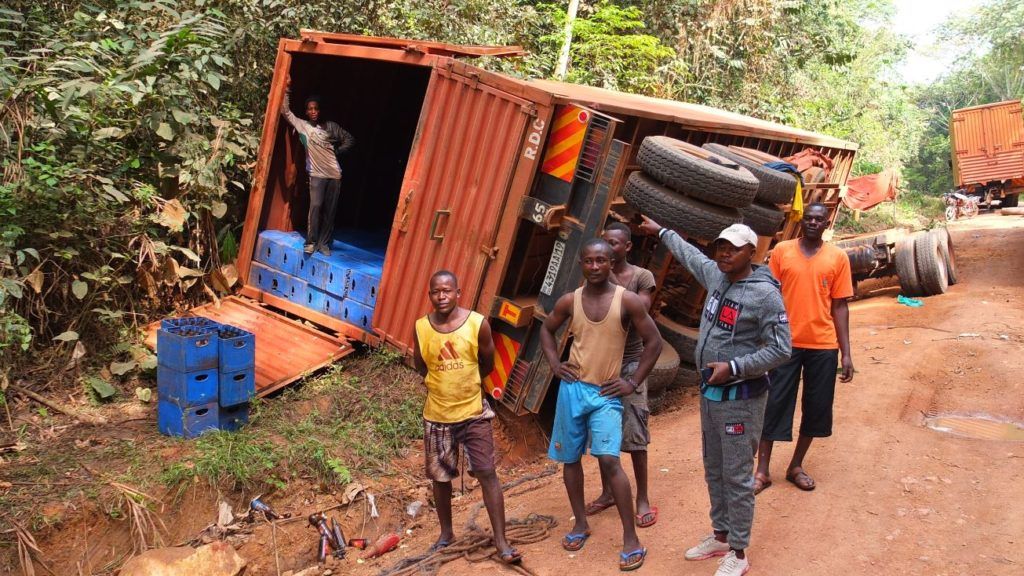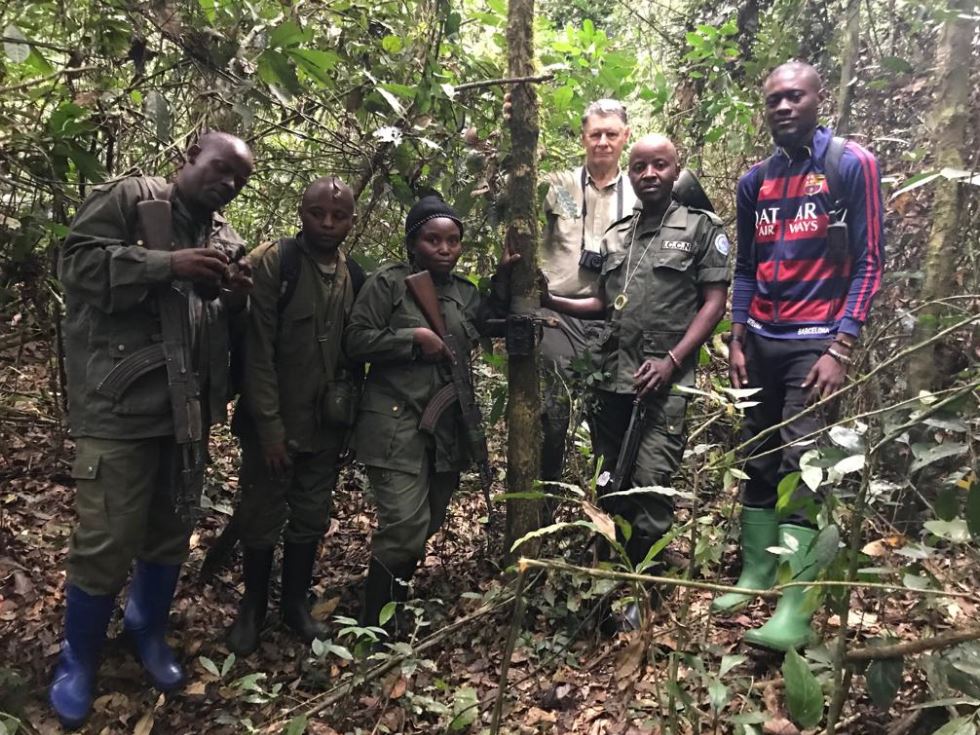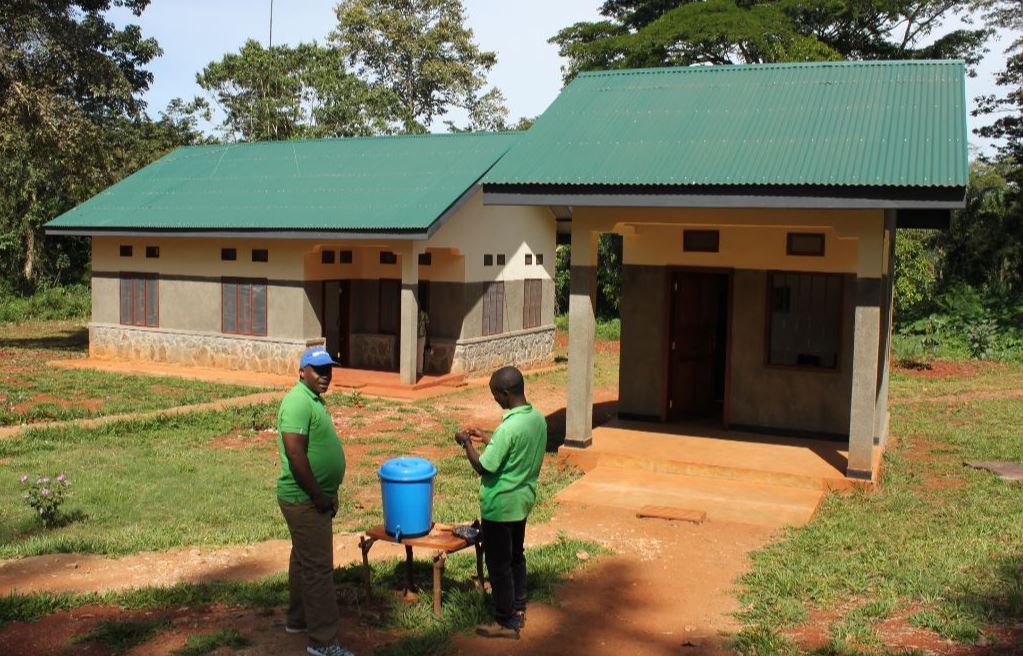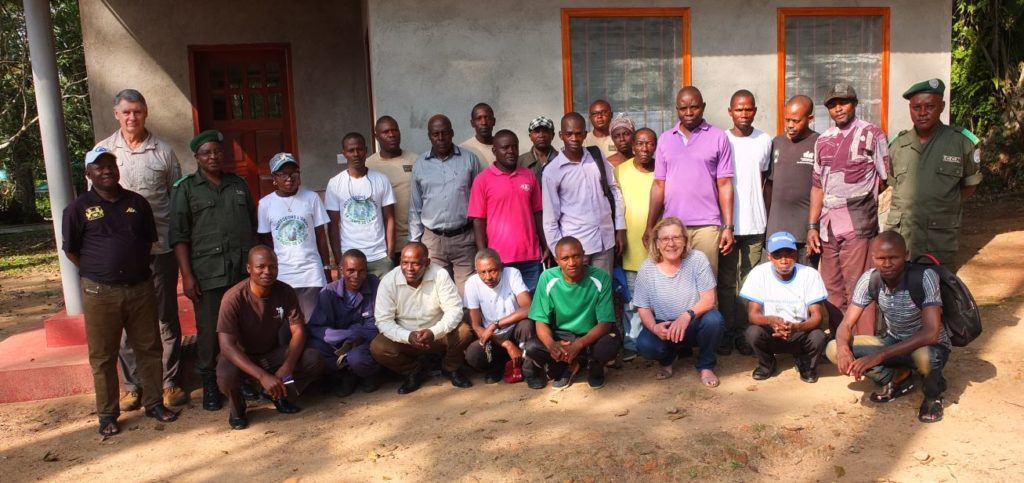Travel to Epulu has become more difficult with DRC not allowing flights from Uganda to land at Bunia Airport. Getting into DRC now requires crossing the border by road which involves leaving the hotel in Entebbe at 5 AM for the MAF base in Kijjansi, flying to Arua in Northern Uganda, getting my first Ebola check, and then hopping into a van with a mix of passengers to drive across the border into DRC. Once over the border, I traveled through three more Ebola checks and my passport information was written down (slowly) seven times in various huts and buildings. I had to show my invitation letters from ICCN as they could not believe I wanted to go to Epulu. After 2 hours, we drove another hour to a dusty strip in Arua to wait for a MAF plane to Bunia. After another passport check, the plane landed, but the crew had teacher salaries which had to be delivered to the bank in town before we could board. A few hours passed, and with 6 passengers in their seats, we finally took off for Bunia where I was fortunate enough to catch a charter flight stopping in Epulu. A trip that used to take 2 hours now took 7 hours to get to Bunia, but at least the Customs thugs couldn’t check my luggage.
It was great to see the Okapi Conservation Project (OCP) team in Epulu, and I wanted to thank them personally for all that had been accomplished and to work with them to develop our work plan for 2019. I usually visit Epulu in January developing budgets and work plans with OCP staff and ICCN, but because of the uncertainty of the response to the presidential election results, I felt it best to wait until the people accepted the results and it was relatively safe to travel to Epulu.
After meetings with WCS and ICCN, the first order of business was checking the camera traps in Mamopi. The forest around this small village is pristine and prime habitat for okapi and many species which we quickly found out when the first camera trap we checked was missing, torn off the tree by an elephant. We located the camera and checked the SD card but it was blank. Most likely the elephant tore it off right after it was put up when human scent could still be detected. We collected 12 more camera traps with fantastic images of okapi, chimpanzees, bongo antelope, elephant, red forest hogs, duikers, leopard and many species of monkeys. Walking through this dense forest you don’t know what is just out of sight waiting for you to pass so they can continue with their secretive lives. The camera traps give us a chance to see only what the Mbuti pygmies see in the forest.
Back in Epulu over the next week we reviewed progress on the 2018 work plan objectives and visited sites of construction projects in Epulu and Mambasa. I was privileged to experience a warm welcome with a stirring song from the Women’s Group in Mambasa. They were thankful for the building we built where they could meet and sew out of the hot sun and safely store their sewing machines and fabric. The Women’s Group in Epulu honored me with a live chicken and a shirt they had made. The building in Mambasa is so successful we are searching for funds to construct buildings for our four other Women’s groups as they are jealous of their friends’ new working conditions in Mambasa.
We are in the process of identifying the resources needed to implement expanded social programs around the Reserve. Lucas and I are working with M’Monga, OCP’s Education Coordinator, to develop an expanded education program, community assistance program and sustainable agriculture program. This information will be used to inform donors of our needs going forward. There are 265 towns and villages in and around the Reserve inhabited by 50,000 people that we need to reach with comprehensible conservation messages. This is a major undertaking.
In order to manage the growth of our community programs we have created a position of OCP Program Manager, who will be responsible for leading the education and agroforestry teams in developing programs and delivering results that promote the importance of what conserving an undisturbed forest means for the community and why protecting it as a valuable resource is a necessity to improve their wellbeing and that of their children. Berce Nsafuansa, who is the son of Jean N’lamba, a co-founder of OCP, is very excited to join our team and started May 2nd. This position will be the main point of contact between OCP programs and the Community Conservation Officer of the Reserve Management Unit.
Ebola remains an issue, many roadblocks are in place where your temperature is checked, and you wash your hands. The first Ebola case in Mambasa, just outside of the Reserve, was reported mid-April. While in Epulu, Rosie and I met with Doctors without Borders and they are coming back to meet with our health care staff and provide written precautions we can distribute. A few of our nurses are vaccinated against Ebola, and we are working to get the entire staff vaccinated. A measles outbreak is spreading quickly as well, which is affected by the peoples’ fear of vaccinations. We are giving our staff directions in personal precautions they can take and access to Doctors without Borders consulting services.
My trip was very productive as I feel we laid the groundwork for a positive, collaborative relationship with our partners. We will be more focused on engaging 50,000 people to care about okapi, their forests and sustainable living. Our standing with the government remains strong as community relationships is one of their main priorities now that a new government is in place. While in Epulu, I had dinner with Bamanisa, who is now governor of Ituri Province in which the Reserve is located. He has long been a friend of our project and he reiterated his support for our mission and offered to help if we needed anything. Our long tenure in DRC has been appreciated by many officials and it is essential in a country like DRC to have allies in power that can help you.
- I met with as many OCP staff as we could get to Epulu in an open forum where I reiterated our goals:
Address threats to the forest resources by a growing human population through the development and implementation of education programs that promote local understanding of and appreciation for okapi, their habitat and the importance of the OWR. - Promote programs in sustainable agricultural practices that reduce the need to convert rainforest into agricultural land reducing the loss of forest cover which is the most serious threat to the survival of okapi in the wild.
- Deliver assistance to communities inside and outside of the OWR that improve delivery of health care, improve access to clean drinking water and promote the empowerment of women.
- Support the protection and management of the Okapi Wildlife Reserve which will benefit okapi, elephants and Mbuti pygmies.
The trip home included an extra 6-hour drive and a pleasant overnight stay with a MAF pilot and his wife, their pet African gray parrot and an orphan Northern white-faced owl that flew around the house all night knocking things over. Leaving Bunia, I was hit with a $5 tourist tax – whose pocket that goes in, nobody knows. Many more Ebola checks later I made it back to Entebbe full of admiration for our staff and the brave rangers who navigate each and every day a disorganized country with a smile, a laugh and with sheer determination.
Thanks to all our supporters who make our work possible. Many, many people and animals are better off because you care.
John Lukas





